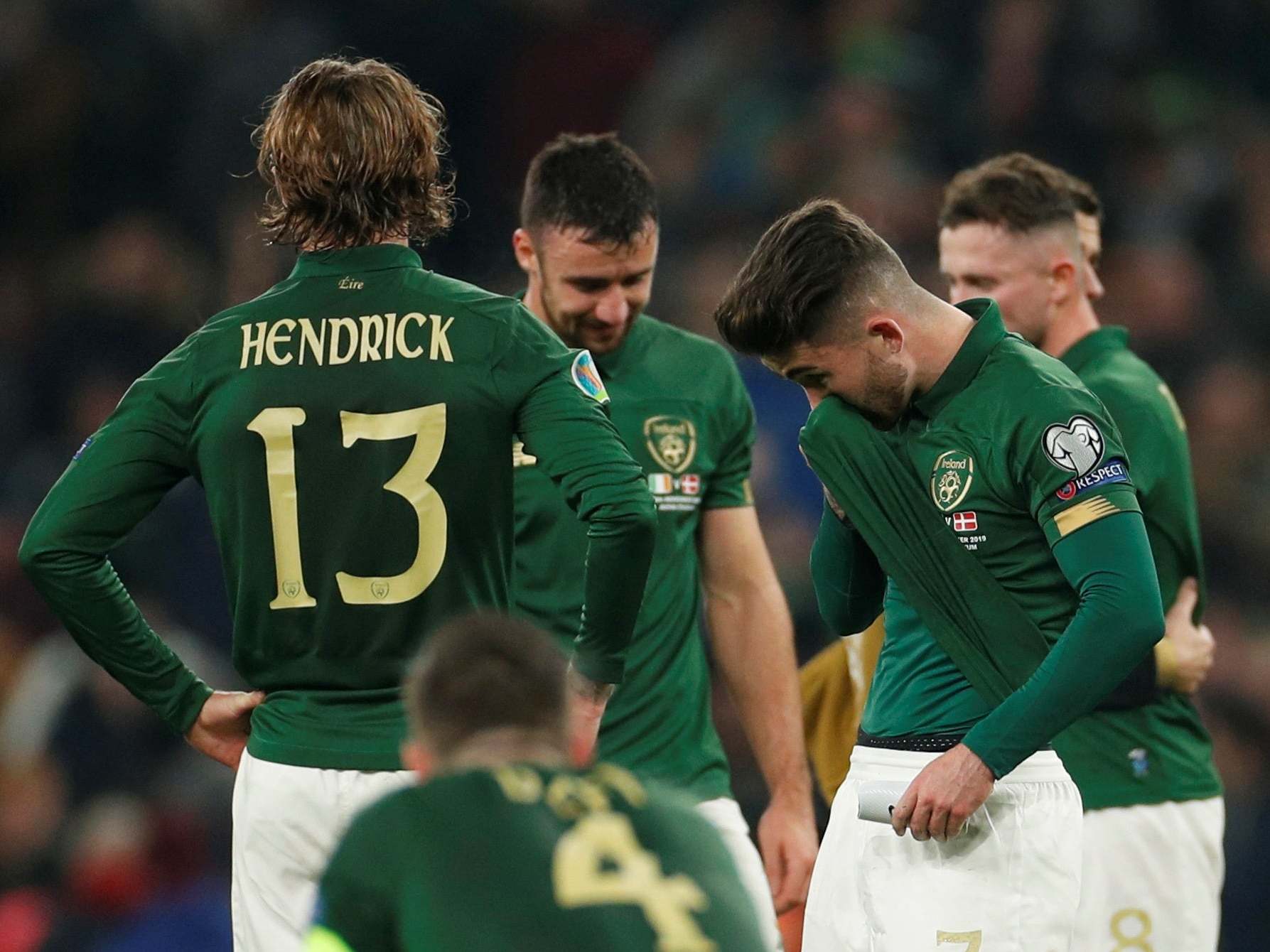Ireland vs Denmark: The predictability of the 1-1 draw and how the result defines them
Ireland 1-1 Denmark: Mick McCarthy’s side will have to go through the play-offs to make it to Euro 2020

It was, like so many Irish attacks against Denmark, so predictable.
Ireland, as expected, end up in the play-offs. That makes it their ninth involvement in such deciders since the route was properly reintroduced for any Uefa qualifying campaign back before Euro 96, which is - remarkably - three more than any other European nation. It is their natural habitat, and something quite respectable for a country that size.
And that, of course, was confirmed by a 1-1 draw. It is their natural scoreline.
The country’s entire modern football history revolves around 1-1s. So many of the great successes and great disappointments involve one, virtually every campaign has one.
Go right back to the country’s football rebirth with that debut qualification for Euro 88. There was a decisive 1-1 with USSR, before two in Italia 90 against England and the Netherlands respectively. It was a controversial and politically-charged 1-1 with Northern Ireland - but a 1-1 nonetheless - that secured passage to USA 94, and then three 1-1s in the post-Saipan 2002 World Cup, the last of which brought a penalty shoot-out defeat to Spain. The Thierry Henry handball ensured that infamous play-off with France ended 1-1, and it was a series of 1-1s that smoothed passage to Euro 2012, with Euro 2016 similarly opening with one against Sweden.
Euro 2020 group stage
Show all 25And here we are again, a 1-1 with Denmark sending Ireland back to a play-off.
It in its own way says much about the very state of the football culture as a whole. Ireland are a country who have consistently been competitive, but usually struggle to really make the breakthrough, and it often feels like a more reactive mode of football is more geared towards defiantly holding their ground rather than looking to open out and play.
Hence the “moral victory” of 1-1 draws seems to suit the entire set-up, representing fair reward for the effort, but reflecting how they didn’t do enough to actually win. That so many involve the Irish being the side to equalise only accentuates that.
So it was in this latest 1-1 with Denmark.
Against a flat-looking side that had appeared there for the taking, a relatively limited Ireland team gamely fought on through some fairly one-dimensional attacks, only really coming alive after going behind. The late Matt Doherty goal - with 85th-minute equalisers themselves becoming a bit of a trend - of course came through a cross and header, that had developed from a set-piece.
It was, again, all so predictable - right down to the third place in the group.
Ireland again perform to par, which is precisely what a 1-1 is.
And yet for all the fair comment about the limited level of this Irish side under Mick McCarthy - himself involved in more of these 1-1s as a player and manager than anyone else - it still feels somewhat frustrating, as if more might be possible.
That is because this entire campaign comes at a crossroads for Irish football, that has almost been symbolised by the forced departure of controversial former chief executive John Delaney.
It was Delaney himself that came up with this halfway-house managerial idea at that crossroads.
With the departure of a similarly reactive manager in Martin O’Neill last year, much of Irish football were crying out for a more progressive and modern choice in repeat domestic title-winner Stephen Kenny. Delaney was prepared to give it to him - but only after a fashion. The former CEO was desperate to ensure Ireland qualified for a Euro 2020 they will partly host - and which he saw as something of a personal achievement - so decided to give McCarthy a two-year deal before Kenny takes over next year, on the basis that the former is a “surer thing”. It is the 1-1 draw of managerial decisions.
And while McCarthy does indeed have an admirable record for making Ireland sure challengers for any opposition, the complication this time is that the country suddenly have a hugely promising group of young talent coming through - spearheaded by Troy Parrott - to go with changes in the way the international game is played.
Kenny is better suited to bringing through that talent, but the eternal question will be whether they should have gone through with his appointment earlier.
Ireland decided against that, on the basis of a short-term decision. It is admittedly a very big short-term decision, given the stakes involved in actually qualifying in a competition you are hosting - but that is still another modern trend in Irish football to go with 1-1 draws and play-offs. It is partly why the 1-1 draws and play-offs have been such trends. Because of always thinking about the short-term. Because Irish managers and teams have mostly sought to quickly cut the cloth to match, rather than seeking to build something more expansive.
It of course means repeated Irish side are admirably competitive, and remarkably consistent. Nine play-offs in 12 campaigns is nothing to be sniffed for a country of that size. Scotland, for one, would envy such opportunities.
It’s just that - yes, like a lot of the football - it’s all rather predictable. More patience, and more vision, might allow more.
But then that’s what’s to come after this campaign. And there’s the hope of yet another play-off before then.
Could be better. Could be a lot worse. Much like a 1-1 draw.
Subscribe to Independent Premium to bookmark this article
Want to bookmark your favourite articles and stories to read or reference later? Start your Independent Premium subscription today.

Join our commenting forum
Join thought-provoking conversations, follow other Independent readers and see their replies